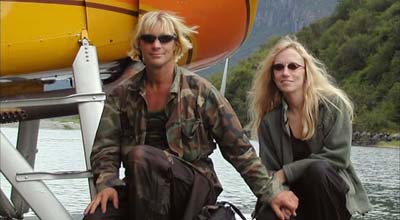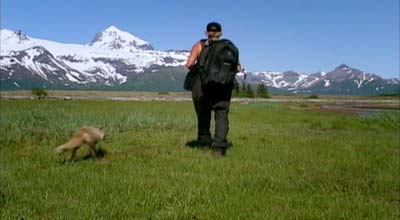Grizzly Man
Harrowing tale of the man who thought he was Mowgli. And got eaten. Such is life...

Timothy Treadwell was, to be fair, a bit of a loser. Legend has it his love for the American Dream was shattered when he came a reputed second to Woody Harrelson for a role in Cheers!, and in search of a greater purpose he set off into the wilds of Alaska where for thirteen summers he lived alongside grizzlies. As you do. And lo it came to pass that on that thirteenth summer The Lord spake unto the bears, and the words he spake unto them were thus; o mighty bear, most noble of my mighty creatures, defender of this land and abider of much that is unjust, go forth and seek out the agitator Treadwell. Seek out the agitator and deliver unto him my wrath. Deliver unto him my wrath by ripping his f**king face off. And his limbs. And then remove his head. And then eat out his chest cavity. So, being God-fearing creatures that's exactly what the bears did, both to Timmy and to his girlfriend Amy Huguenard. Natch.
Fortunately enough for anyone wishing some insight into the mind of such a clearly deluded man, Treadwell saw fit to carry a video camera for the last five summers of his life, documenting over hundreds of hours of footage his observation of, and downright foolish interaction with, the native grizzly bears of Alaska. It is from this footage that director Werner Herzog, himself something of a "grizzly man" in filmmaking terms, compiles most of his documentary, inter cutting Treadwell's on-camera antics with his own narrated views and interviews with friends and relatives of the deceased. If it sounds a far cry from the usual Herzog effort you'd be right, and while there's no place for the late Klaus Kinski, as Werner himself observes he's seen this kind of madness on a film set before.
The great difficulty traditional filmmakers encounter when attempting documentary making is in keeping a balance between detached observation and involved commentary, which is understandable given that you've probably spent most of your working life trying to achieve exactly the opposite. Fortunately Herzog proves far too smart to fall into that trap, and Grizzly Man achieves a near perfect equilibrium of exposition and opinion. The director wisely allows Treadwell, a somewhat pathetic ghost from the past, to do most of his own talking without intervention, preferring instead to let his friends and relatives build a more detailed picture of the man through a series of intimate conversations that punctuate the film. Chief among the conspirators is former Treadwell girlfriend and long-time fellow animal rights activist Jewel Palovak, who remained Timothy's best friend and offers the most biased but human glimpses of the damaged man who desperately sought some sort of meaning in his adventures.

Further input is offered via the coroner who had the not-so-enviable job of piecing Timothy back together, the pilot and friend who ferried him to and from the wilderness and was first to witness the aftermath, an actor friend who seems more intent on appearing deep and meaningful himself than offering much of any interest, and crucially an eerily detached mother and father whose quiet introspection borders on the disinterested. Through these interviews Herzog attempts to resolve Treadwell's unintentionally self-deprecating monologues to camera with a better view of the damaged man beneath, and while at first the unwitting leading man seems simply to be a complete knob, there is the expected lonely childhood motif to be found upon closer inspection. Fortunately Herzog spares us the patronising route of pitying the boy who never grew up, offering this insight instead as a mark of understanding rather than sympathy.
Of course the star of the show, bears aside, is Timothy himself, and by God does he make for interesting viewing. It's likely the viewer will find themselves by turn despising his simpering speeches of love and affection for his "friends" and sympathising with his obvious loneliness and lack of place in the world. It's hard not to think "arsehole" while he's stroking a fox and crying because of the "friendship" it has supposedly offered him over the years, but in retrospect that becomes a little harsh. However, while it's easy to laugh at such a pathetic figure, as Treadwell's enemies point out his "friendly warrior" schtick was not only foolish in jeopardising his own life, but downright irresponsible in it's de-sensitising of dangerous animals to the presence of humans.
Whatever your resultant view of the picture's dubious "star", the real purpose of Grizzly Man is to observe the results of one man out of place, alone amongst "the overwhelming indifference of nature", and how his belief in an understanding that simply did not exist proved to be a fatal mistake. While audio of the fatal attack remains (there is no film as Herzog points out Treadwell had no time to remove the lens cap), the director steers clear of using it; a counter-exploitative decision to be applauded. There is plenty of fundamentally disturbing footage as it is, and the screams of a dying man wouldn't necessarily enhance the sense of his steady descent into paranoia and delusions of grandeur. Sit back, but don't necessarily relax as this is the best "mankind in the wild" picture since Touching The Void.
Jewel Palovak (Herself)
Werner Herzog (Himself)